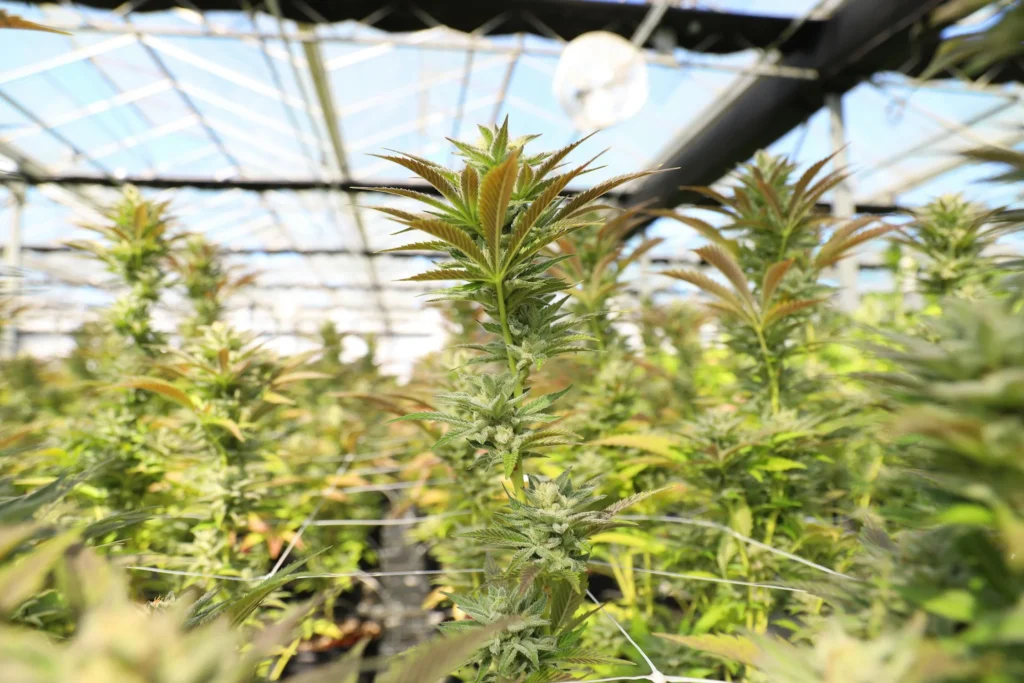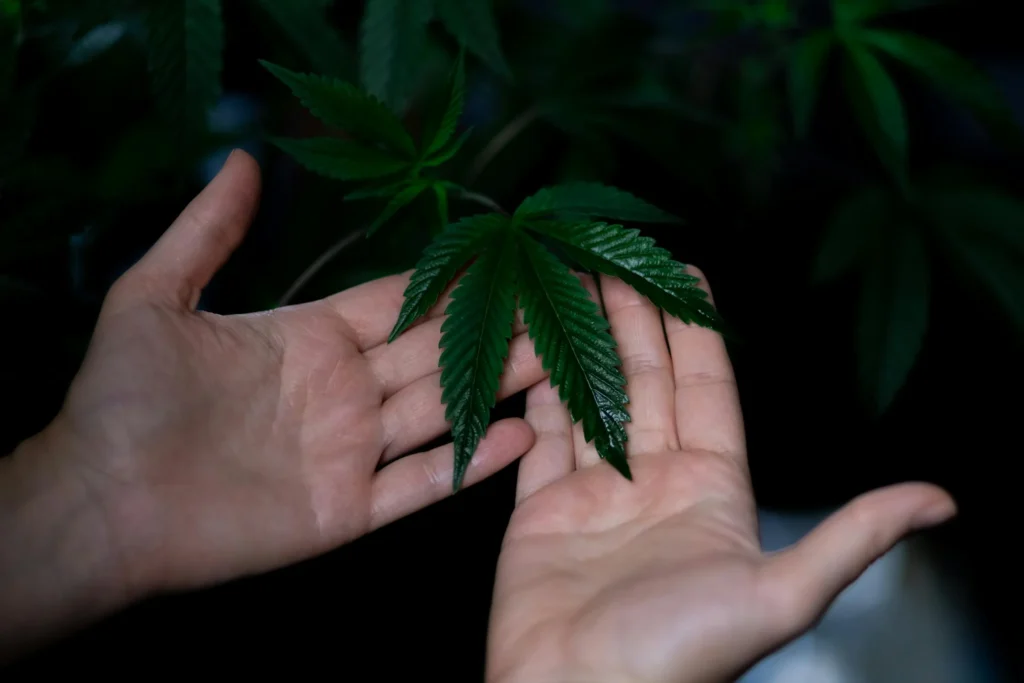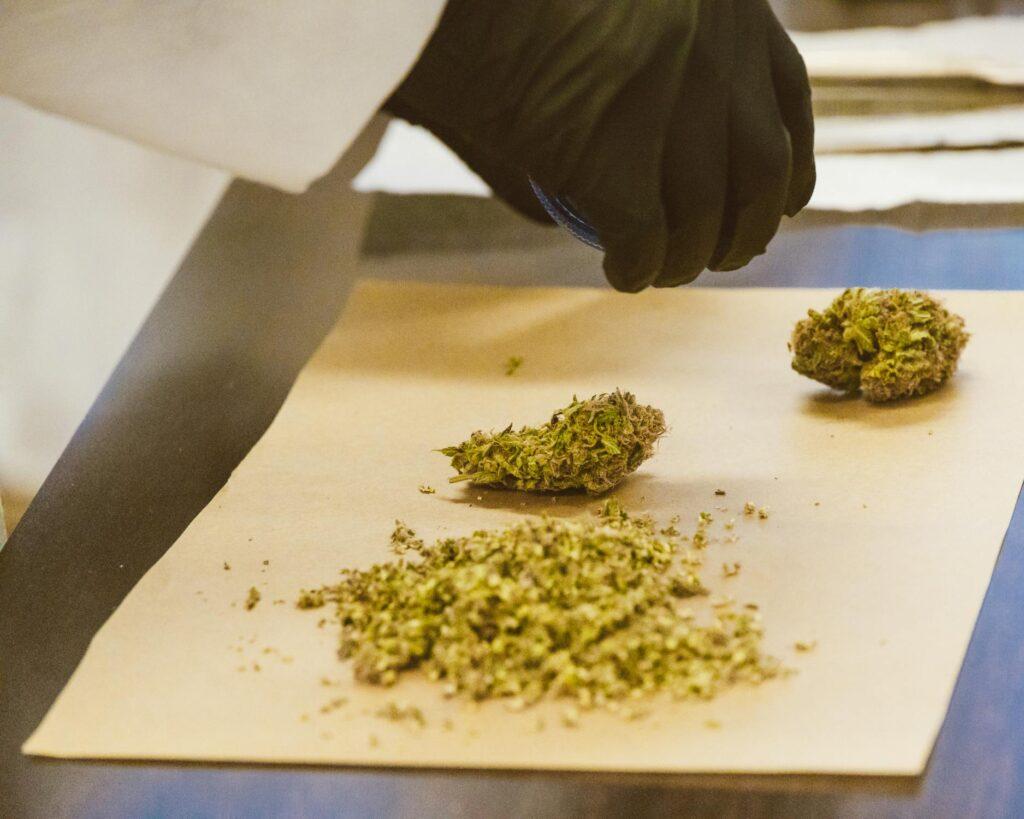
What Is The Advantage Of Organic Hemp?
3/12/2024
Innovation & Production • Innovation & Production
When it comes to hemp cultivation and product creation, the choice between organic and non-organic practices holds newfound importance. As consumers increasingly prioritize sustainability and health, the demand for organic hemp products has soared.
What sets organic hemp apart, and why is it considered superior?
Organic hemp isn’t just a label—it’s a commitment to a healthier and more sustainable future. With a dedicated focus on eco-friendly practices, manufacturers ensure that every step of the cultivation and production process aligns with rigorous organic standards.
To grasp its significance, we must investigate its definition, the certification process, and the broader implications of these practices.
Understanding Organic Hemp
The term “organic hemp” goes beyond a mere marketing label. It embodies a robust commitment to sustainable practices that prioritize the health of the environment, farmers, and end users.
At its core, organic hemp cultivation adheres to stringent environmental standards. It forgoes synthetic pesticides and fertilizers in favor of organic alternatives. This approach promotes soil health, biodiversity, and it minimizes the environmental impact of farming.
The journey to achieving the organic label involves a thorough certification process overseen by accredited bodies. From soil management to pest control, every aspect of cultivation undergoes scrutiny, ensuring compliance with rigorous organic standards.
This meticulous process validates the product’s organic status and reflects a dedication to environmentally conscious practices.
The importance of organic hemp extends beyond a marketing claim. It contributes to resilient agricultural ecosystems, fostering soil fertility and water conservation. By avoiding synthetic chemicals, it prioritizes the well-being of farmers and end-users.
In essence, understanding organic hemp entails recognizing this holistic approach. It also harbors an appreciation for the broader impact of embracing sustainable practices for a healthier, more environmentally friendly future.

What Sets It Apart
Organic hemp stands out due to its stringent cultivation regimen that prohibits the use of synthetic pesticides, herbicides, and chemical fertilizers. This commitment actively embraces natural processes and materials to enhance the soil, control pests, and maintain a healthy growing environment.
Cultivating organic hemp embraces the presence of a thriving, biodiverse ecosystem. Ultimately, this provides a supportive foundation for the health and vitality of the plant.
The organic certification process for hemp goes deeper than merely eliminating the presence of synthetic chemicals. It involves a comprehensive set of criteria, including crop rotation and other soil management practices aimed at bolstering soil health and fertility.
By integrating these practices, organic hemp cultivation fosters a resilient soil structure that benefits not only the current crop but also future harvests.
Using non-GMO seeds in organic hemp cultivation adds an extra layer of assurance regarding the crop’s genetic integrity. This commitment aligns with the broader ethos of organic farming, emphasizing sustainability and natural processes.
To prevent contamination, another key facet of organic certification involves maintaining a buffer zone between organic and non-organic fields. This precautionary measure underscores the dedication to purity. It also ensures that the organic integrity of the hemp is maintained throughout its growth process.
A meticulous record-keeping system is an integral part of the organic certification process, tracking practices from seed to sale. This level of transparency instills confidence in consumers and facilitates accountability throughout the supply chain.
By documenting every stage of the cultivation and production journey, organic hemp certification reinforces the commitment to quality and ethical practices.
In a nutshell, what sets organic hemp apart is the holistic embrace of sustainable, natural practices that create a flourishing ecosystem. It ensures the health of the plant, the soil, and the overall environment.

The Importance of Certified Organic Practices
Certified organic practices are vital for several reasons:
- Environmental sustainability: Organic farming supports ecological balance and biodiversity. By avoiding toxic chemicals, organic hemp farming minimizes harm to the surrounding ecosystem.
This includes beneficial insects, birds, and other wildlife. The sustainable approach conserves water, reduces pollution, and contributes to the health of the local environment.
- Soil health: Organic practices enhance soil structure and fertility. By using natural compost, avoiding soil erosion, and encouraging biodiversity, organic farmers maintain and improve the soil’s health. This practice supports healthier plant growth.
- Reduced exposure to toxins: For consumers, organic hemp products mean reduced exposure to residues of pesticides and other chemicals. These contaminants could be harmful to health. This is particularly important for products that are ingested or applied to the skin.
- Enhanced nutritional content: Some studies suggest that organically grown plants, including hemp, can have higher levels of certain nutrients and antioxidants. This outcome is due to the improved soil health and reduced chemical interference. Research is ongoing, so these findings aren’t conclusive.
Understanding the depth and breadth of what it means to grow hemp organically highlights the commitment required to meet these standards. The rigorous process ensures that every product bearing the organic label meets the highest standards of purity and environmental stewardship. This sets organic hemp apart from its non-organic counterparts.
Why Organic Hemp is the Future of Sustainable Agriculture
The Role of Hemp in Regenerative Agriculture
Regenerative agriculture is a farming philosophy aimed at restoring soil health, enhancing water retention, and reversing the effects of climate change. Hemp plants play a vital role in this system due to their deep roots, which help to aerate the soil and increase its organic matter content.
Organic hemp, with its emphasis on natural processes and soil health, is perfectly aligned with the principles of regenerative agriculture.
Carbon Sequestration and Climate Change
The ability of hemp to sequester carbon is another feather in its cap. As hemp grows, it absorbs carbon dioxide from the atmosphere, storing carbon in the biomass and soil, which can help mitigate the effects of climate change.
Organic practices enhance this process by maintaining soil health and encouraging the growth of a robust, carbon-absorbing plant.
The Advantages of Organic Hemp
Organic hemp stands out for the multitude of benefits it offers. These advantages span from the superior quality of the final product to the positive environmental impacts and the health benefits for consumers.
Superior Quality and Purity
The quality and purity of organic hemp are unparalleled. Grown without synthetic pesticides, herbicides, or fertilizers, organic hemp plants can produce cleaner and purer extracts.
- Higher cannabinoid and terpene profiles: Organic cultivation methods allow hemp to grow in a more natural state, which can lead to higher levels of cannabinoids and terpenes. These compounds are responsible for the therapeutic effects associated with hemp products, meaning organic hemp can often offer more potent health benefits.
- No contaminants: With strict regulations against the use of synthetic chemicals, organic hemp products are less likely to contain harmful contaminants. This is particularly crucial for products consumed or applied topically, where purity directly impacts safety.
Environmental Benefits
The cultivation of organic hemp significantly benefits the environment, embodying practices that support ecological balance and conservation.
- Biodiversity: Organic hemp farming encourages a biodiverse agricultural environment. By integrating crop rotation and avoiding monoculture practices, organic farms support a wide range of organisms. These range from beneficial insects to microorganisms in the soil, which contribute to a healthy ecosystem.
- Soil health: Organic practices enhance soil fertility and structure, preventing soil erosion and degradation. Healthy soil is crucial for absorbing carbon, which can mitigate the effects of climate change.
- Reduced pollution: By avoiding synthetic chemicals, organic hemp farming drastically reduces water, air, and soil pollution. In turn, this ensures that nearby communities and wildlife are not exposed to toxic substances.
Health and Safety Considerations
Choosing organic hemp products offers significant health and safety benefits for consumers, stemming from the strict standards governing organic cultivation and processing.
- Reduced exposure to chemicals: Consumers of organic hemp products benefit from reduced exposure to the residues of pesticides and other harmful chemicals. This is especially important for those with sensitivities or health concerns related to chemical exposure.
- Enhanced nutritional value: Preliminary research suggests that organically grown plants, including hemp, might offer higher nutritional value. It is believed to contain more vitamins, minerals, and antioxidants due to the healthier soil and growing conditions.
- Trust and transparency: The rigorous certification process for organic products provides consumers with a higher level of trust and transparency. When a product is labeled as organic, consumers can be confident about the absence of synthetic chemicals and the use of sustainable farming practices.
Supporting Sustainable Practices
Choosing organic hemp products not only benefits the consumer but also supports farmers and companies’ committed to sustainable and ethical practices.
- Encourages sustainable farming: By purchasing organic hemp products, consumers are voting with their wallets for a more sustainable and environmentally friendly approach to agriculture.
- Promotes ethical business practices: Companies that invest in organic certification often hold broader commitments to social and environmental responsibility. These benefits include fair labor practices and community engagement.
The Materia Regenerative Approach to Organic Hemp
Commitment to Quality and Sustainability
At Materia Regenerative, our commitment to quality and sustainability is unwavering. We adhere to certified organic and cGMP (Current Good Manufacturing Practices) standards to ensure that our hemp extracts and products are safe, effective, and environmentally responsible.

Tailored Solutions for Conscious Brands
We understand that each brand and consumer has unique needs. As a result, we offer customized product formulations and solutions. Whether it’s economical minimum order quantities, custom products, packaging, or financing, our flexible organizational structure allows for tailored solutions that fit your specific requirements.
Understanding the Value Behind the Price
Organic hemp products often come with a higher price tag compared to their non-organic counterparts. This price difference can be a point of contention for potential customers.
Understanding and communicating the reasons behind this pricing is key to overcoming price objections. Which aspects impact the price?
The cost of organic certification
- Rigorous standards: Achieving and maintaining organic certification requires adherence to stringent standards. This adherence can significantly increase the cost of production.
These standards ensure that every product is free from synthetic pesticides, herbicides, and fertilizers. It also necessitates more labor-intensive cultivation practices and often results in lower yields.
- Quality and safety: The higher price reflects the superior quality and safety of organic hemp products. Consumers investing in organic hemp avoid exposure to harmful chemicals and support environmentally friendly farming practices.
Long-term value
- Health benefits: The absence of harmful residues in organic hemp products can contribute to long-term health benefits for the consumer. Avoiding these chemicals can reduce the risk of possible health issues, potentially saving on future healthcare costs.
- Environmental impact: By choosing organic, consumers are investing in the health of the planet. Sustainable farming practices have a lower environmental impact. Ultimately, it promotes soil health, biodiversity, and reduced pollution.
This long-term perspective highlights the broader value of organic products beyond their immediate cost.
Smoother Processing With Materia Regenerative
At Materia Regenerative, we prioritize quality, sustainability, and customer service, offering significant benefits. We understand your needs and aim to deliver superior quality and service with every purchase.
How do we do this?
Streamlined process
- Personalized support: We provide personalized support, addressing specific needs and concerns along the way.
- Sample products: Offering samples allows potential customers to experience the quality difference firsthand.
Building a partnership
- Understanding business needs: We take the time to understand each customer’s unique business needs, enabling us to offer tailored solutions that fit.
- Flexibility and customization: The ability to provide customized formulations, packaging, and minimum order quantities demonstrates our flexibility. Making us the best option for businesses looking to differentiate themselves in the market.
Meeting and Exceeding Industry Standards: Certifications
In a market that values transparency and quality, certifications are a powerful tool for overcoming objections related to product standards and compliance.
We understand the importance of certifications:
- cGMP compliance: Adhering to Current Good Manufacturing Practices (cGMP) standards is essential for ensuring that products are consistently produced and controlled accordingly. Matergia Regenerative complies with these standards, reassuring customers of our commitment to safety and quality.
- Organic certification: Organic certification is a testament to our adherence to stringent agricultural and processing standards. This certification gives customers confidence in the organic integrity of the products they purchase.
Our quality goes beyond certifications, looking at transparency and education:
- Transparent practices: Materia Regenerative goes beyond certifications by maintaining transparency in our sourcing, manufacturing, and business practices. This openness builds trust with potential customers.
- Educational efforts: Through education on the benefits of organic hemp and the importance of certifications, we help customers understand the value they receive. This education can address concerns related to price and product quality, facilitating informed purchasing decisions.
Frequently Asked Questions
Are you compliant to cGMP?
Yes, Materia Regenerative strictly follows Current Good Manufacturing Practice (cGMP) standards, which involve rigorous quality control measures at every stage of the production process. This ensures that our products meet the highest quality standards and consistently deliver excellence in terms of safety, efficacy, and overall quality.
Can it be certified organic?
Absolutely! Materia Regenerative proudly offers certified organic hemp extracts and products that adhere to stringent USDA guidelines. Our commitment to organic certification underscores our dedication to delivering premium-quality, natural products while prioritizing environmental sustainability and consumer well-being.
What is the turnaround time for an order?
The turnaround time for orders varies based on the complexity and nature of the product. For raw material samples, the process can take anywhere from 1 day to 6 months. For finished goods, the turnaround time ranges from 1 month to 12 months, ensuring meticulous attention to quality and detail throughout the production process.
Conclusion
Organic hemp represents a commitment to a healthier, more sustainable future. The organic farming process adheres to stringent environmental standards and a meticulous certification process. Its advantages span superior product quality, positive environmental impacts, and health benefits for consumers.
The organic route offers a holistic embrace of sustainable, natural practices, fostering a flourishing ecosystem. Certified organic practices contribute to environmental sustainability, soil health, reduced exposure to toxins, and enhanced nutritional content. As a proponent of regenerative agriculture, hemp, especially when grown organically, plays a vital role in restoring soil health and mitigating climate change.
The advantages of choosing organic hemp extend beyond immediate costs, offering long-term health benefits and contributing to a healthier planet. At Materia Regenerative, we emphasize this value, providing a streamlined process, personalized support, and flexibility for businesses. cGMP and organic certifications underscore our commitment to safety, quality, and transparency.
As advocates for a greener and healthier future, we invite you to join us on this journey. Contact Materia Regenerative today to explore our range of high-quality, mission-driven organic hemp products. Let’s cultivate a sustainable and conscious lifestyle together.




